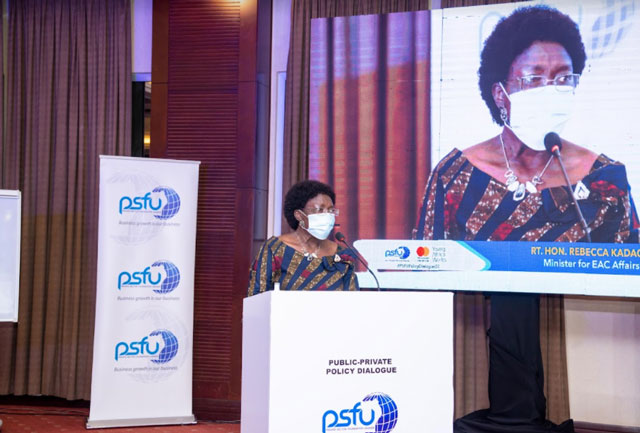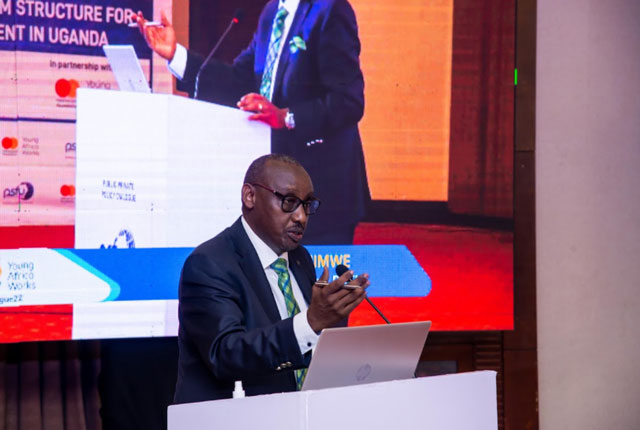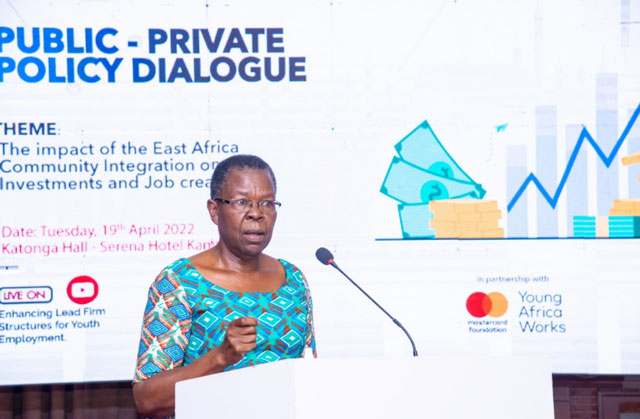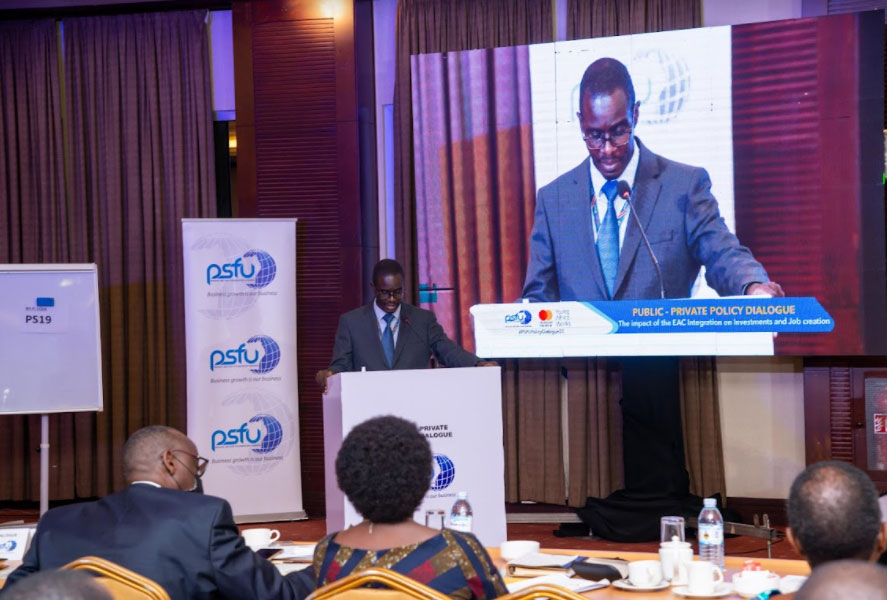
PSFU hosts a High-Level Public-Private Policy Dialogue on the status of the East Africa Community integration process on investments and job creation
Kampala, Uganda | THE INDEPENDENT | First Deputy Prime Minister Rebecca Kadaga has urged the Uganda government and the private sector to focus on tapping into the DRC and West African market, as the East Africa Community integration process takes root.
As Minister in charge of East Africa Affairs, she has also revealed that Uganda is ready to host the regional monetary institute and the Central Bank of East Africa. Her home country is competing for this right with Kenya, Tanzania and Burundi as the region prepares to have a single currency in 2024.
“After meeting officials of the Africa Continental Free Trade Area (ACFTA) recently, I went to Cabinet of Uganda and I said I want to see the Prime Minister lead a trade delegation to West Africa. I also want the Ministry of Works to introduce cargo flights to West Africa,” Kadaga said.
She added that, “West Africa is so near….. many countries there do not even have vegetables or bread produced locally. There is so much more we can do, we need to take action to move there quickly.”
Kadaga was speaking Tuesday in Kampala, at a high level Private-Public Policy dialogue on the status of East Africa Community integration on investments and job creation held in Kampala, “to get the young person’s outlook on the status of the EAC and an overview on the future”.
The dialogue was organised by the Private Sector Foundation Uganda (PSFU) the apex body of the private sector in Uganda, in partnership with the Mastercard Foundation and Young Africa Works Uganda. It was attended by over 100 key members of the business community, young entrepreneurs, academia, media and public officials to generate solutions to addressing the issues constraining the performance of the EAC and her implications of investments and job creation for Ugandans.

DRC early this month joined the EAC as its seventh member, raising excitement about the possibilities for increased trade, investment and job creation for the traditional members Uganda, Kenya and Tanzania.
” On issue of markets…we are really asleep. For us we are happy people, we are asleep,” Kadaga said as she observed a failure to tap on new opportunities.
Kadaga said opportunities for Uganda have increased with the bigger market of over 283 million people -with over 80 million from DRC.
Earlier, Corti Paul Lakuma, a Research Fellow at the the Economic Policy Research Centre (EPRC) had painted a grim picture of the unemployment situation in the region. The EAC has now about 120 million youth (aged 15-35yrs) – of which between 60-80 million are unemployed.
FULL DIALOGUE VIDEO
“I will be happy to take advice, and look forward to working with you all, to achieve objective of the common market. The key is in activating the common market protocols, in all its forms, in all the freedoms, in all the rights. The right of establishment and right of residence,” Kadaga said.
Kadaga however noted the several handicaps that have to be overcome.
” One of the problems are embedded in the structure of the treaty. All decisions are by consensus. Consensus was okay when we were three, but now we are 7…we are becoming monolithic,” she remarked. She also regretted that there are no sanctions for inaction.
Kadaga observed also that the treaty does not speak to the national laws in some cases.
She explained that “What was intended was the common market which came in 5 years after the custom union, was supposed to integrate the economies of the region, give opportunity to the private sector and increase competitiveness…. but I think it is still work in progress.”
Stop loose talk
Victoria Sekitoleko, the Vice-Chair of the PSFU was critical of the way government decisions are made and their communication strategy. She said focus needs to be put back on skilling at all levels, from officers to cabinet, so that the country has true ambassadors at the regional level.
She hailed Acting Commissioner for Economic Development Joseph Enyimu for his presentation, that hall all the elements often missing when our economic ambassador address audiences abroad.
“You make listening easy. You wake up, own your document, and you present it. That is the type of Ugandan I would like to attend a meeting abroad with and say….. Yah, mutulabye!”

She urged the ministry of finance in particular to always consult the stakeholders before key decisions are made.
From the day’s conversation, solutions which should be taken to plan for the emerging opportunities, especially for the young people in the EAC integration process were discussed.
According to Stephen Asiimwe, Chief Executive Officer- PSFU, “there are existing business opportunities that can be harnessed to support the growth of the economy and job creation. Presently, the ecosystem, the companies and SMEs continue to be negatively affected by some market restrictions which hinder their ability to expand and grow and create both direct and indirect work opportunities to the youth in the value chains.”
“Six weeks ago, we were in Nairobi with the East African Business Council and we drafted a common paper which is going to be presented at the Heads of State Summit to ensure that the private sector voice is heard before the president’s make meaningful decisions,” Asiimwe added
According to the 2021 report by the World Bank, East Africa, one of the hardest hit regions by the third wave of the coronavirus was expected to rebound from 3.3 percent in 2021 and 3.4 percent in 2022. Several countries have since embarked on difficult but necessary structural reforms that address digital infrastructure gaps and make the economy more inclusive – ensuring affordability and building skills for all segments of society and generate more and better jobs for young men and women.

The dialogue was also meant to sensitize the public, especially MsMEs and the young people in business on the existing and emerging opportunities in the EAC customs union to foster industrialization and growth of the private sector in Uganda.
PSFU, Mastercard Foundation in the lead
Private Sector Foundation Uganda (PSFU) is Uganda’s apex body for the private sector. It is made up of over 200 business associations, corporate bodies and the major public sector agencies that support private sector growth.
Since its founding in 1995, PSFU has served as a focal point for private sector advocacy as well as capacity building and continues to sustain a positive policy dialogue with Government on behalf of the private sector. PSFU aims to strengthen Private Sector capacity for effective policy advocacy and market competitiveness nationally, regionally and internationally. Regionally, PSFU is the national focal point for the East African Business Council (EABC) and the COMESA Business Council (CBC).
Private Sector Foundation Uganda (PSFU) is partnering with Mastercard Foundation to anchor the Young Africa Works strategy in Uganda. Under the Young Africa Works strategy by Mastercard Foundation, PSFU has designed and will implement the Lead Firm Structure Project for Youth Employment in Uganda.

Africa will be home to the world’s largest workforce, with 375 million young people entering the job market by 2030, according to Mastercard.
“With the right skills, these young people will contribute to Africa’s global competitiveness and improve their lives and those of their communities.”
The Mastercard Foundation will implement Young Africa Works in 10 African countries in collaboration with governments, private sector, entrepreneurs, educators, and young people.
The first phase of countries identified by the Mastercard Foundation are Rwanda, Kenya, Ghana, Senegal, Ethiopia, Ghana, and Nigeria.
 The Independent Uganda: You get the Truth we Pay the Price
The Independent Uganda: You get the Truth we Pay the Price




The meeting will help boost Uganda’s economy.